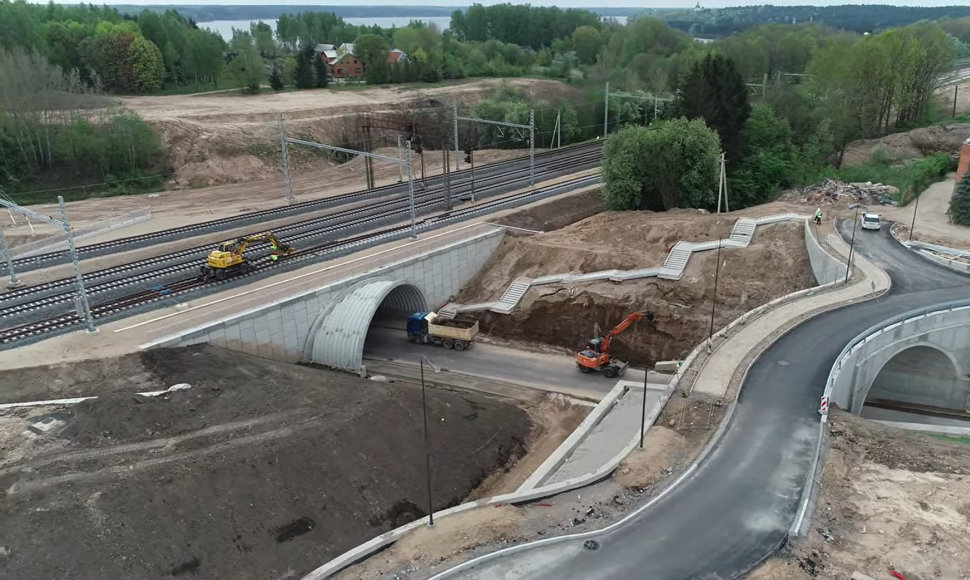This spring the implementing countries – Lithuania, Latvia and Estonia, as well as the project coordinator RB Rail – submitted inquiries to the European Commission about extra financing for the Rail Baltica project in the Baltic states. The combined financing required for the project from the EU that was indicated in the countries’ application was EUR 664.1m, of which EUR 278.9m is Lithuania’s allocation. However, to date, only a part of the sum of EUR 183.8m has been approved for all applicants, of which EUR 30.4m would go to Lithuania. It is planned that the project partners will still be able to negotiate between one another on redistributing the financing between the project countries as per the mutually agreed priorities for the Rail Baltica project.
“The fact that the European Commission is upholding its commitments despite the COVID-19 crisis which demands massive extra resources, installs positive sentiment. It means that Rail Baltica is viewed as a mature project and remains a priority for the entire Union,” Republic of Lithuania Minister of Transport Jaroslav Narkevič noted. “Nevertheless, the latest decision by EU institutions to allocate to Lithuania a far lower than requested sum could limit our capabilities to perform works in line with planned deadlines and extents. As such, we will have to carry out risk assessments because, with the EU not allocating necessary financing in time, we may be unable to begin work planned for the closest deadlines and so be unable to complete the project by its planned date of 2026. As we are not curtailing our ambitions for the project, we hope that in the near future the remaining part of the required financing will also be allocated. The Rail Baltica stretch from Kaunas to the Lithuanian-Latvian state border remains a priority for us. Currently, we have completed consultations with construction companies on public tenders for the purchase of contracting works and contracting tenders have been issued. However, we will only be able to accomplish such work to the extent that we have received funding.”
He also added that the European Commission’s particular focus on the Rail Baltica project is demonstrated in that more than half of this period’s CEF budget is allocated to it – EUR 606m out of EUR 1.14bn. More than EUR 422m has been allocated to project works in Poland. This will provide the opportunity for the residents of the Baltic States to reach Warsaw and other European countries faster.
The comments of the minister of transport and communications were echoed by AB Lietuvos Geležinkeliai (LTG) director-general Mantas Bartuška: “The allocation of extra financing is the best indicator that EU support for implementing the largest railway infrastructure project in the history of the Baltic States is not waning. Currently, we can advise that we are carrying out a lot of preparatory work and in the near future, we will be able to achieve greater activity levels than was the case with the financing which was allocated previously. The Rail Baltica stretch from Kaunas to the Lithuanian-Latvian state border remains a priority. Currently, we have concluded consultations with construction companies on public tenders for contracting works and have issued contracting tenders. However, we will only be able to perform the works to the extent that we have received funding. As such, timely and sufficient financing is a key condition for the project to be implemented as per the established budget and deadlines, namely by 2026.”
The forecast cost of works on Rail Baltica in the Baltic States will reach EUR5.8bn. It is the largest investment in the region aimed at increasing mobility and travel opportunities, developing business, tourism and goods exchange. It is planned that EU support for this project across the entire period should reach around EUR4.9bn.
With this latest EU financing allocation, the Rail Baltica project has secured a total of EUR 942m in EU support or 19% of all financing required from the EU. Of the EURm2.1bn needed by Lithuania, it has so far secured EUR 339m. “We hope that negotiations on the next EU Multiannual Financial Framework will be successful and this priority EU project will receive the necessary financing,” Minister of Transport and Communications Jaroslav Narkevič added.
About the Rail Baltica project
Rail Baltica is the largest railway infrastructure project in the Baltic States’ history. In implementing it across the Rail Baltica route, an electrified European standard gauge railway line will be laid down, starting from Warsaw through Kaunas to Riga and onward to Tallinn, with a branch to Vilnius. This will ensure all three Baltic States capitals will be connected via the railway line.
The combined length of the Rail Baltica railway line across the Baltics reaches 870 km: 392 km in Lithuania, 265 km in Latvia and 213 km in Estonia.












